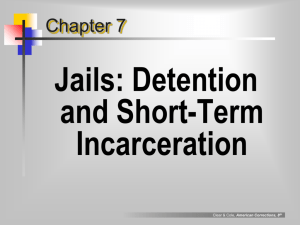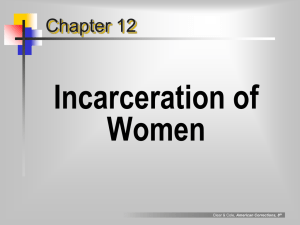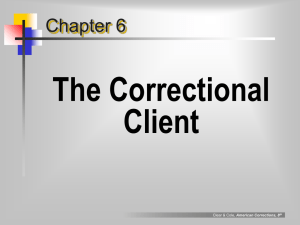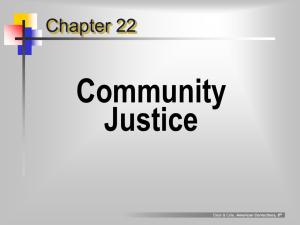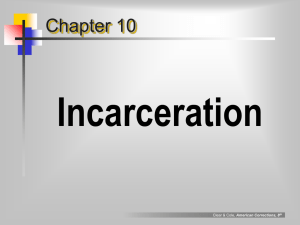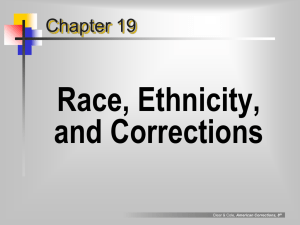Jails: Detention and Short
advertisement
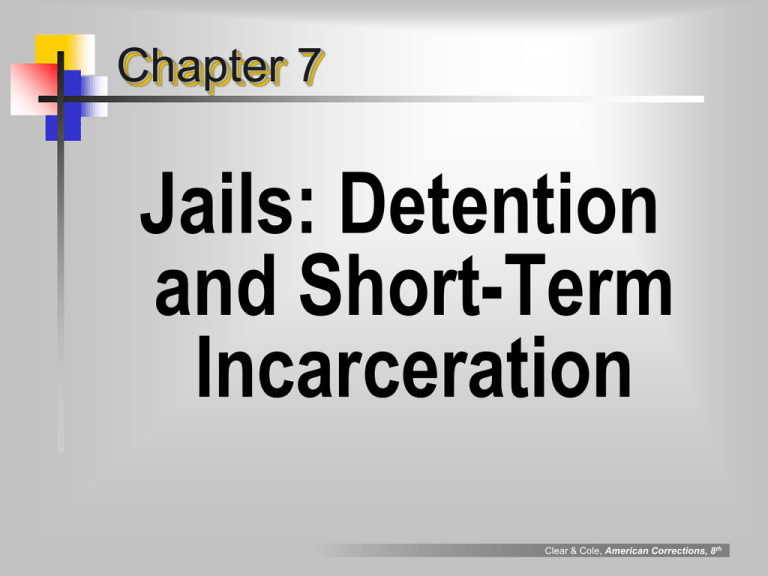
Chapter 7 Jails: Detention and Short-Term Incarceration Clear & Cole, American Corrections, 8th Detention and Short-Term Incarceration The Contemporary Jail: Entrance to the System Origins and Evolution Population Characteristics Administration The Influence of Local Politics Regional Jails Pretrial Detention Special Problems of Detainees Release from Detention Clear & Cole, American Corrections, 8th Detention and Short-Term Incarceration The Bail Problem and Alternatives Release on Recognizance Preventive Detention Pretrial Diversion The Sentenced Jail Inmate Issues in Jail Management Legal Liability Jail Standards Personnel Matters Jail Crowding The Jail Facility Clear & Cole, American Corrections, 8th Americans jailed annually Clear & Cole, American Corrections, 8th Characteristics of Adult Jail Inmates in U.S. Jails Clear & Cole, American Corrections, 8th “Lockup” A facility authorized to hold people before court appearance for up to 48 hours. Most lockups (also called drunk tanks or holding tanks) are administered by local police agencies. Clear & Cole, American Corrections, 8th getting out of jail -- free? bail sum of money specified by judge to be posted by the accused as condition of pretrial release, to ensure defendant’s appearance in court methods of release bondsman independent businessperson who charges fee, usu. 5-10% for bail money (ROR) release on recognizance pretrial release granted on the defendant’s promise to appear in court, based on defendant’s ties to the community “10% cash bail” (reform) D. deposits 10% of bail amount with court; 90% returned at trial Clear & Cole, American Corrections, 8th Type of pretrial release Clear & Cole, American Corrections, 8th Myths in Corrections Myth: Jail sentences are more for misdemeanants than they are for felons. Fact: Nearly 40% of felony defendants are eventually sentenced to jail, a rate that is almost the same as prison sentences for felonies. Clear & Cole, American Corrections, 8th “preventive detention” detention of an accused in jail to protect the community from crimes the accused is considered likely to commit if released from jail while he awaits trial authorized by Comprehensive Crime Control Act, 1984 upheld in US v. Salerno, 1987 Clear & Cole, American Corrections, 8th “pretrial diversion” an alternative to adjudication in which the defendant agrees to abide with conditions set by the prosecutor in exchange for the withdrawal of charges (e.g., counseling, drug treatment) reasons for diversion programs criminal justice system is not well equipped to handle some problems - vagrancy, alcoholism, juveniles keep less dangerous offenders from being labeled & treated as hard-core criminals diversion costs are less Clear & Cole, American Corrections, 8th “widening the net” increasing the scope (i.e., reach) of corrections & CJS by creating diversionary program & then sending people to that program for offenses that are much less serious than those the program was originally intended for. “diversion” programs thereby ensnare persons who would otherwise not have come under the jurisdiction of the justice system (except for availability of the diversion program) Clear & Cole, American Corrections, 8th “new-generation jail” a facility of “podular” architectural design and with management policies that emphasize staffinmate interaction and the provision of services to inmates Clear & Cole, American Corrections, 8th “podular unit” self-contained living area for from 12 to 24 inmates, composed of private, individual cells & open areas for social interaction each jail has two or more “pods” Clear & Cole, American Corrections, 8th “direct supervision” a method of correctional supervision in which staff have direct physical interaction with inmates throughout the day Clear & Cole, American Corrections, 8th “regional jail” facility operated under a joint agreement by two or more governmental units (e.g., city + county), with a jail board made up of representatives from participating jurisdictions and having authority over policy, budget, operations, and personnel Clear & Cole, American Corrections, 8th “fee system” a system in which jail operations are to be paid on the basis of a flat allocation per prisoner per day problem: creates an incentive for poor jails & inadequate services, since the allocation remains the same, irrespective of the level of service provided Clear & Cole, American Corrections, 8th “pay as you go” jails (“user fees”) some jails are experimenting with directly charging inmates (who can afford it) at least some of the costs of their “keep” daily room and board “co-pay” for nurse sick call “co-pay” for medical specialist Clear & Cole, American Corrections, 8th special problems of jail detainees jail issues mental health problems substance dependency rights of pretrial detainees legal needs medical needs Clear & Cole, American Corrections, 8th problems of jail administration legal liability 42 USC §1983 jail standards (ACA) jail management issues personnel matters ($, training, conditions) jail facilities (outmoded & expensive) jail crowding (crisis in ‘90’s) Clear & Cole, American Corrections, 8th
